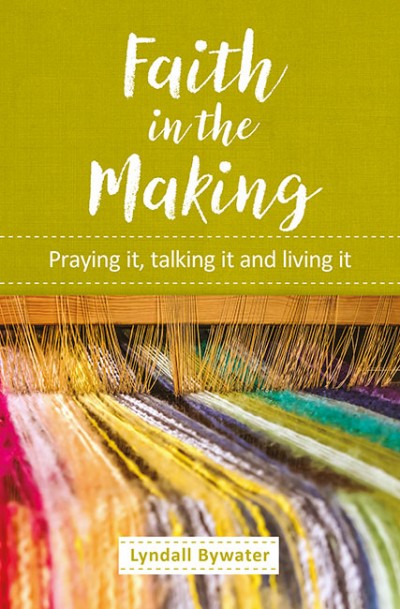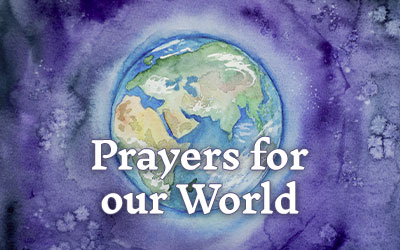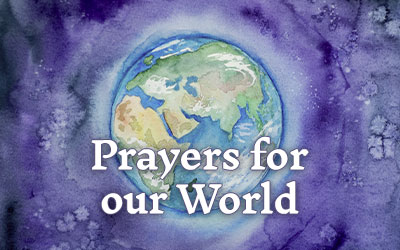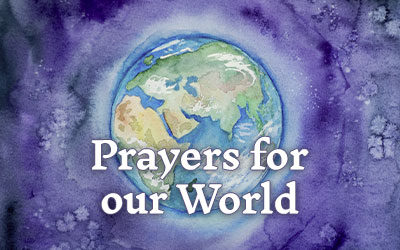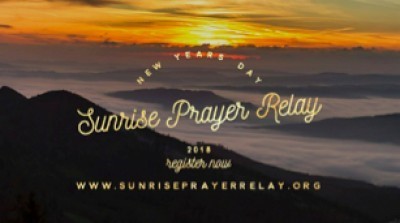Faith in the Making
01 Feb 2018Faith in the Making by Lyndall Bywater
Price: £7.99
If 'faith is being sure of what we hope for and certain of what we do not see' what does that look like in practice today? In a world that is largely unsure and uncertain, how do we gain our confidence?
Faith in the Making recognises the problem and seeks the answer in the list of faithful heroes found in Hebrews 11. This accessible, devotional resource will inspire individuals and groups to live more confidently for God in today's world. Heroic faith is far more attainable than we often think!
A trumpet call to turn back to God
01 Feb 2018The Children of Israel heard the trumpet call many times on their journey through the deserts to the Promised Land. In the seventh month, there was a blast of trumpets to proclaim a holy gathering and day of rest (Lev 23:24). Similarly, the tribes were called with a trumpet blast to stand before Mount Sinai - wrapped in smoke because the Lord descended on it in fire (Ex 19:18). They are told they must send a loud trumpet throughout the land to proclaim the Day of Atonement (Lev 25:9). In Numbers 10, they are told that trumpets will sound to summon the congregation and to break camp. When the walls of Jericho fell the trumpets blew. 120 trumpeters made a huge noise of praise and worship when Solomon dedicated the temple. Psalm 98 tells us to make a joyful noise before the King, the Lord with trumpets and the sound of the horn.
On Saturday 9th June 2018 at the International Convention Centre Birmingham, we shall be sounding the trumpet.
- It will be a trumpet call to mobilise God's people to come and pray for our nation to turn.
- It is a trumpet of declaration - it is time for an unprecedented turning in our nation.
- It is the trumpet of victory - walls, barriers and obstacles come down.
- It is a trumpet of consecration - it draws God's people into His presence.
Joel 2 shows the link between turning and trumpet blowing - "Even now" declares the Lord, "return to me with all your heart, with fasting and weeping and mourning." At this late time, we can still turn. "For He is gracious and compassionate, slow to anger and abounding in love, and He relents from sending calamity. Who knows? He may turn and relent and leave behind a blessing." (Joel 2: 12 - 14). Here is this wonderful picture of our God and a marvellous insight into turning - as we turn, God turns. Turning shifts things in heaven.
Joel then takes this time to turn further "Blow the trumpet in Zion, declare a holy fast, call a sacred assembly, gather the people, and consecrate the assembly." Joel 2 :15, 16. It is time to gather. This is the great call for our times - it is time for God's people and our nations to turn away from our wicked ways and to turn to the love, mercy, forgiveness and power of Jesus.
Jean Darnall brought a substantial prophetic word to our nation fifty years ago. God was going to renew His church and awaken this nation. We would see fire and lightening and a powerful move of the spirit of God. We believe that time is now. So, we call you and your friends, and your church to a solemn assembly on 9th June.
Let us stand together to pray for renewal in the church and an awakening in the nation. It is time to turn.
It's time to turn and seek God for Brexit
01 Feb 2018Our UK decision in June 2016 to leave the European Union has been, and still is, a huge learning curve to all people with a heart to pray and work to see God's Kingdom be more fully seen and experienced. In the past, we may have approached 'big' issues from the same perspective and been able to come to a place of unity together but not so with 'Brexit'. Differing views have brought tensions in every area of our society and that includes our churches! One of the results of this that we can sidestep the urgent need to pray.
It is time to turn and seek the face of our Father in order to discern His plans and His purposes through all that is taking place regarding Brexit and its impact over our UK nations, the European Union, Europe and the rest of the world.
Over recent months in our World Prayer Centre days of prayer we have been asking the Lord to teach us how to pray and He has been clearly responding with 'it's time to turn'. The call to turn involves us laying down our own agendas, taking our eyes off our preferences, stances, political leanings and whether we voted Remain or Leave and to turn to Him afresh. We must put our trust in Him as Lord in and through all the shaking and uncertainty that we experience at every level of society - not only in the UK but all over the world.
We, as His church, need to be united and focussed on praying for His Kingdom to come in and through all of this so that heaven's purposes can be released on earth.
Praying for
His purposes to be revealed (Psalm 33.11)
His ways to be made known (Psalm 25.10; Ps 77.13)
His truth to emerge (John 14.17)
His justice to be outworked (Leviticus 19:15)
His mercy to be poured out (Habbakuk 3:2)
His compassion to be seen (Colossians 3:12)
His peace to be evident (Galatians 5:22)
His wisdom to be given (James 3:17)
For our leaders: for those negotiating with the European Union; for those working on the redrafting of our UK laws; that our Westminster and UK government leaders will not get distracted by the enormity of Brexit and be able to govern wisely; for political stability in our Westminster government and for a clear roadmap to emerge in these next few months before March 2019.
Let's make this a season where we adopt in prayer leaders including: Theresa May; Dominic Raab Secretary for Exiting the European Union and his team (Lord Callanan Minister of State; Robin Walker MP; Chris Heaton-Harris MP; Suella Braverman MP); Michel Barnier, as Chief Negotiator for the 27 EU countries and his deputy Sabine Weyand; Didier Seeuws (European Parliament); Donald Tusk (European Council); Jean-Claude Junker (European Commission): and other national leaders in Europe during this season - remembering leaders in Scotland and Wales and the situation in Northern Ireland without a functioning Assembly (1 Tim 2:2).
For reconciliation and trust: whatever agreements are finally agreed, humanly speaking it will all depend on those people meeting and discussing face to face. For those meetings to deliver what the Lord wants there will need to be trust, understanding and the ability by each party to listen to what is being proposed. As we write, there is talk of a vote of no confidence in Theresa May, disagreements between cabinet ministers - and in recent weeks we have seen how media leaks of supposed conversations in closed meetings in the 'Brexit talks' were not found to be true.
When we know of key dates of meetings; hear reports of disagreements, let's stand in the gap wherever we are and use arrow prayers for God's mercy, God's wisdom and God's healing 'Your kingdom Come' (2 Corinthians 5:18-21).
For the media: for those working in the media to resist sensationalism and to uncover the truth in each situation… and for us to discern from the newsfeeds what are the real issues we need to be praying for and into (John3:21).
It's time to turn in humility and repentance (2 Chronicles 7:14) - in order for His purposes and plans to come for our UK nations, for the EU nations and the other nations within our continent. We are a continent that has turned our backs on our Father. The consequences are being worked through in every nation.
crying out for His mercy (Psalm 2.8)
knowing our position in Him and the authority we as His children and as His church have been given (Ephesians 1:3-7, 2:6-10, 3:16-19)
worshipping and declaring that he is Lord over all His earth, the people, the nations, the leaders, the land and put our trust in Him (Colossians 1.15ff; Psalm 24)
praying for peace, truth, mercy and justice to meet together (Psalm 85:9-13)
for courage for His church across our continent (Acts 4:27)
for Gods blessings to be released (Deuteronomy 28:1-14)
For spiritual awakening in every people group and nation (Isaiah 64)
For millions to come to know Jesus as Lord (Psalm 67.6).
Brexit is an opportunity for us to learn afresh how to partner with our Father in these times of shaking and harvest as we learn afresh to trust in Him alone and see His glory revealed (John 11:40). We believe God has a very immediate plan and purpose for our nation - and our relationship with Europe - let us continue to pray for his sovereignty (Psalm 2:10-11)
----------------------------------------------------------------------------------------------------------------------------------
Timeline:
Phase I: Jan-March 2018: this phase has been set aside to firm up the conditions for the post-Brexit transition period requested by Britain. Key dates: March 22-23, 2018: EU summit in Brussels where the transition phase will be decided, the divorce bill legally drawn up and Michel Barnier given a mandate to negotiate the EU's future relationship with Britain.
Phase II: April 2018 to late October 2018. EU: The goal for October 2018 is to finalize a withdrawal treaty governing the UK's departure from the EU as well as a political framework agreement covering the future relationship between the two entities.
--------------------------------------------------------------------------------------------------------------------------------------
Some Resources:
Passion for the Nation declarations: http://passionforthenation.uk/brexit-10/
Operation World http://www.operationworld.org/country-lists
Canopy of Prayer http://www.canopyofprayer.eu/
Europe shall be saved http://esbs.org/esbs/
European Union of Prayer http://euofprayer.eu
European Evangelical Alliance http://www.europeanea.org
Pray for France https://prayforfrance.org/
https://epthinktank.eu/2018/01/17/europes-challenges-in-2018-ten-issues-to-watch/
The Lord's Prayer outline for praying for Brexit.
A Day of Prayer for Britain: Praying over Brexit, Unity and Reformation in the Church, Friday 23 March 2018, at Emmanuel Centre, London called by David Hathaway. More details from: http://propheticvision.org.uk/
The WPC Team
We extend greetings and blessings from the Christian church in Bolivia. We are very grateful for your prayers in favor of our continent. Those who could participate in the UPRISING organized in Bolivia in November 2017, now understood in greater depth the role of prayer to transform a nation and now we can see many results of those days of UPRISING, since the prayer in Bolivia has risen a lot.
On January 10, 2018, the Extraordinary Assembly of the National Association of Evangelicals of Bolivia (ANDEB) was held, with the participation of different denominations, missions, evangelical organizations, and some Evangelical United Departmental and Regional Churches to analyze the situation of the country and draw conclusions and determinations regarding the enactment by the President in exercise of Law 1005 of the Code of Procedure of the Bolivian Criminal System, as according to this Code, our country faces the possibility that as of 2019, evangelism activities are punishable by law.
In this sense, we request you to pray for our country, with the following prayer requests:
1. Pray for the ABROGATION of the aforementioned Law 1005 of the New Bolivian Penal Code.
2. Pray for the unity of ALL the Evangelical Church in Bolivia through its National, Departmental and Regional representation bodies in such a way that we are one voice, according to the prayer of our Lord Jesus Christ "So that all may be one ... so that the world believes that you sent me.”
Cochabamba, January 18th, 2018
Asamblea General Extraordinaria
Asociación Nacional de Evangélicos de Bolivia (ANDEB)
Iglesias Evangélicas Unidas Departamentales (IEUD
Members of the IPC Leadership Team joined Pastor Jerome and Mrs Abel Ocampo and the organisers of regional United Prayer Rising events in Jakarta on 23rd and 24th January 2018 for a summit.
The purpose of the meeting was to report back on the recent events and plans for forthcoming gatherings. In particular, the group prayerfully explored the possibility of organizing a Global Uprising event in Jakarta during October 2018. The vision is to see 2,000 Indonesian young people meet up with a further 2,000 youth from the other nations of the world.
Pictured below are all the attendees with Pastor Niko from the Sentul ICC.
A recurring theme during the times of prayer and worship was Isaiah 43: 9-10 - “Forget the former things; do not dwell on the past. See, I am doing a new thing! Now it springs up; do you not perceive it? I am making a way in the wilderness and streams in the wasteland.” During a visit to the Sentul International Convention Centre Prayer Tower, the leaders had a sense that something extraordinarily new and exciting was about to happen that would blow our minds!
The group of young leaders agreed to form part of an Indonesia Dream Team that would input to the program planning processes for the Global Uprising. The provisional date of October 24-26 and the venue will be confirmed shortly.

Please pray:
> For protection, wisdom, and for the right doors to continue to open for these young people who have dedicated time, energy and skills to the United Prayer Rising Events.
> For Pastor Andy Tjokro (Jakarta) as he co-ordinates the various planning teams for the Global Uprising.
> For substantial funds to be released to undergird the regional and global events planned for the next few years. (Mal 3:10)
> For the Manilla based team who support and direct the events under the leadership and guidance of Pastor Jerome Ocampo.
An Urgent Request to keep those in South Sudan in our daily prayers with those on the ground there has been requested.
You may remember recently a new ceasefire was put into place. PRAY it holds. Join with them, in prayer. “We are persuaded that it is the prayer of God’s children that is keeping this nation”. “The earth is the LORD’s, and everything in it, and all who live in it.” Psalm 24:1.
• PRAY for the Intercessors worldwide to catch the urgency to pray for the stability of South Sudan.
• PRAY that the Almighty God will divinely and quickly intervene in the situation of the nation.
• PRAY and ASK the Father to send His angels to defend the nation against internal conflicts and instability.
• ASKING all Intercessors to pray prophetically over South Sudan.
We are persuaded that it is the prayer of God’s children that is keeping this nation. “The earth is the LORD’s, and everything in it, and all who live in it.” Psalm 24:1.
South Sudan is on a serious spiritual battle field, please cover us daily with your prayers. Jesus reigns over the earth including South Sudan.
Please circulate this to urgently mobilize prayers for this nation.
I R A N
Since December 28, tens of thousands of Iranians have taken to the streets in huge numbers of towns and cities to demand better economic conditions and freedom from their oppressive religious government and the bad. Prices of basic goods had, in the past year, increased by roughly 40 percent. The protests began over Iran's stagnant economy and the rising cost of living but quickly have developed into a broader outcry against the oppressive government.
These demonstrations have become the most powerful challenge to the Iranian government's authority since mass demonstrations in 2009.
At least 20 people have since been killed in clashes with security forces, and more than a thousand of mostly young people have been arrested.
The head of Iran's Revolutionary Guards said that the anti-government protests were over now as the government very violently cracked down on them.
K U R D I S T A N
We thank the Lord that we can continue to work in Kurdistan and for the family that will soon go there.
The Kurdish Pastor who was for nearly two years imprisoned in Kurdistan and has moved with his family to a neighbouring country, finally after about 5 years got residency for this country.
The strong tensions between the government of Iraq and Kurdistan has not been resolved. The tension is still there and the possibility of fighting breaking out between the Iraq and Kurdistan. Also it seems clear now that the Iraqi government will continue to ban direct flights into Kurdistan (Erbil & Sulaymaniyah).
PLEASE PRAY for
I R A N
• For this difficult situation in Iran. Only God can cause the leadership of this nation and their severe oppression of its people to change.
• That many of them would hear the Good news and that all these difficulties cause even more Iranians to accept the Lord.
• Protection of our brothers and sisters in the country and courage to reach out with wisdom and boldness to the Iranian people.
K U R D I S T A N
• For a good settlement between the Iraqi and Kurdistan governments and that the airports would soon open up again.
• That all the preparations for the couple that plans to move to Kurdistan would be completed soon and that they would be able to move there in the next few weeks and build up our work and ministry in the country.
• For the Kurdish church to grow throughout all the Kurdish regions.
• The Kurdish Kanal Hayat TV Programs to be watched by millions of Kurds! For more presenters for these programs.
Thank you for your prayers for these countries and the challenges they are facing and for believing with us that in the midst of these difficulties God expand His kingdom.
Your ElRock Team
See some of the USA testimonies from Florida, South Dakota and Tennessee.
We are cheating a bit to say 50 countries because Puerto Rico is part of USA but they seem to regard themselves as another country. These countries included in the 50 are Australia, Austria, Bahamas, Burundi, Cameroon, Canada, China, Congo, Côte d'Ivoire (Ivory Coast), Czech Republic, Denmark, England, Fiji, France, Germany, Ghana, India, Indonesia, Iraq, Israel, Japan, Liberia, Kenya, Mauritius, Namibia, New Zealand, Nigeria. North Korea, Pakistan, Papua New Guinea, Philippines, Puerto Rico, Rwanda, Russia, Samoa, Saudi Arabia, Singapore, Solomon Islands, South Africa, South Korea, Sweden, Switzerland, Tanzania, Thailand, Tonga, Tunisia, United Arab Emirates, Uganda, USA and Vanuatu.
Check out more testimonies HERE - There are many more still to come!
Suffice to say from small beginnings in 2016 the New Year’s Sunrise Prayer Relay is exploding. There were 23 NATIONS where locations were confirmed in 2017 for the New Year's Day Sunrise Prayer Relay, so we have had a huge multiplication of people, locations, and nations praying in 2018. We believe that when people pray God moves and we are expecting Him to move powerfully in 2018 in EVERY NATION as we continue to pray for awakening, revival, and transformation in the name of Jesus.
This year we had 141 REGISTERED GLOBAL PUBLIC LOCATIONS with hundreds more that are private. This was an increase from around 100 on New Year's Day 2017, we are still going through the global registrations to confirm but at this stage we can say there were over 400 valid registrations worldwide this year, it was very difficult to confirm some of the locations and we are currently looking into more effective ways to register locations globally.
We also know of many locations globally that were not registered, or informed us via email or message that they were praying with us, we did not count these. We believe that the number of unregistered locations is greater than the number of registered locations. We need to simplify to multiply in other nations, and we would love to get prayer networks in nations like USA, UK & South Africa more involved to help with getting the word out and administration in their countries the way National Day of Prayer & Fasting has done for Australia.
The beauty of the New Year’s Day Sunrise Prayer Relay is that it is short (30 MINs),easy to do, easy to promote, requires minimal effort, is organic in nature, rides on an existing established event (New Year’s Day Sunrise) and has a proven track record of encouraging and reproducing more daily, weekly and monthly prayer events.
Warwick Marsh & Pat Steele
Global Coordinators Sunrise Prayer Relay
www.sunriseprayerrelay.org
